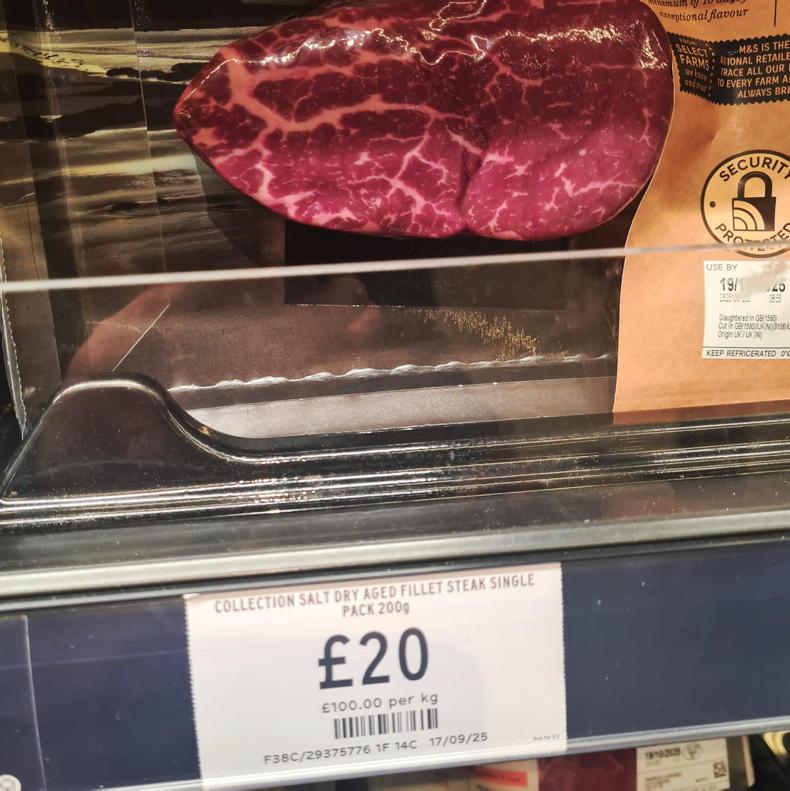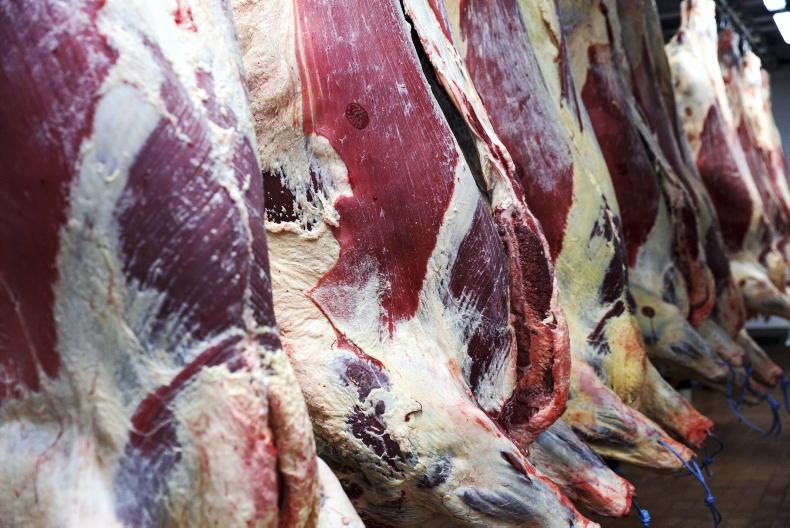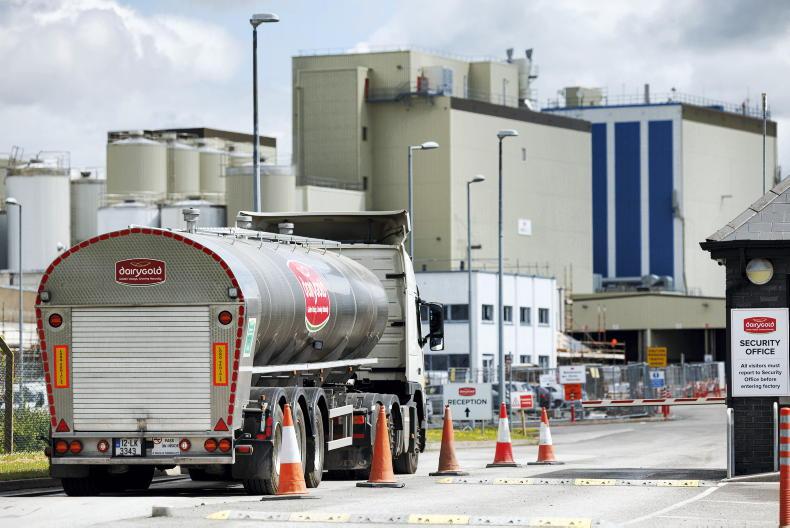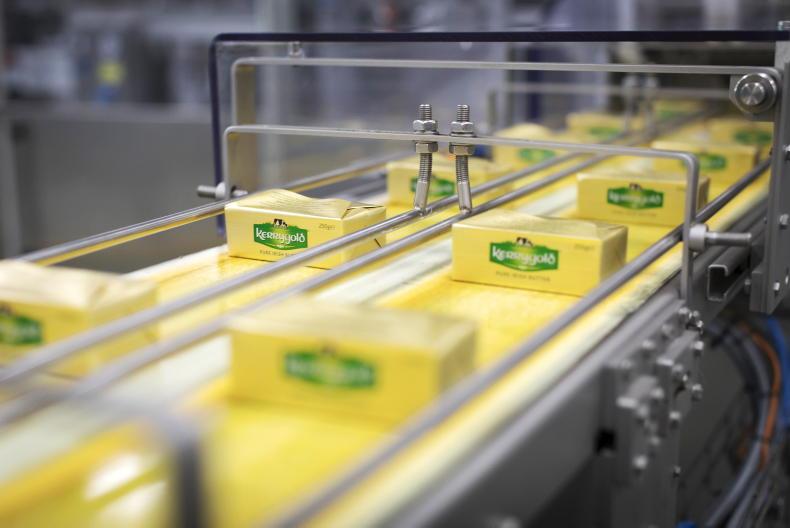Once the jewel in the crown and the engine of growth for many years, Glanbia plc’s Performance Nutrition division endured a difficult 2019 as profits, profit margins, sales volumes and prices all declined in the business.
The weak performance in its Performance Nutrition business saw Glanbia report a double-digit decline in profits for its overall business for 2019 as well as its first decline in adjusted earnings per share (EPS) in almost a decade.
Speaking to the Irish Farmers Journal this week, Glanbia’s group managing director Siobhan Talbot admitted 2019 had been a challenging year for its Performance Nutrition division.
“The drag on our Performance Nutrition business was down to a number of things. Firstly, we increased our marketing spend on our brands last year, particularly our Slimfast and Optimum Nutrition brands,” said Talbot.

Siobhan Talbot, Glanbia group managing director. \ Dylan Vaughan
“However, the biggest theme in 2019 is that we experienced issues across a number of international markets and we lost some very profitable business, which reduced profit margins,” she added.
Glanbia’s Performance Nutrition business manages a portfolio of brands valued at $1.4bn (€1.3bn), of which the Slimfast and Optimum Nutrition brands account for almost $1bn (€920m). The Performance Nutrition business is fundamentally based out of North America and exports to distribution partners in international markets like Brazil, India, Europe and China. Up to now, this has proved extremely profitable for Glanbia but a combination of tariffs, currency headwinds and domestic competition resulted in a very challenging 2019.
Talbot said her number-one focus for 2020 is to return the Performance Nutrition division to organic growth and try to rebuild profit margins. The Glanbia boss said the target is to rebuild profit margins in Performance Nutrition close to 13% by 2022.
To achieve this, Talbot said the company would increase its focus on its two core Performance Nutrition brands, Optimum Nutrition and Slimfast.
Optimum Nutrition recorded mid-single-digit growth in 2019 as sales reached $655m (€600m), while Slimfast recorded very strong growth of 49% in its core North American market.
Shareholders in Glanbia will be watching closely over the coming years to see if senior management in the company can deliver on this stated strategy. The Performance Nutrition division has driven almost a decade of growth at Glanbia and was long admired as the jewel in the crown. Can it be turned around to regain this position or will it become a thorn in the side for Glanbia’s bottom line with falling margins? The next three years will tell a lot.
Glanbia profits fall to five-year lows
For its 2019 financial year, Glanbia plc reported total group earnings (EBITA) of €240m, which was down 16% compared to the previous year. Earnings margins in the business weakened from 9% in 2018 to just 6.2% last year as a result of the weaker profitability in its Performance Nutrition division. Glanbia incurred exceptional costs of €37m last year, which were mostly attributed to a major reorganisation of its Performance Nutrition division.
The group reported full-year sales of just under €3.9bn for 2019, which was up 17% year on year and was mostly driven by acquisitions (+10%). The Performance Nutrition and ingredients giant reported adjusted earnings per share of 88.1c per share, which was down 3% on the previous year and at the lower end of Glanbia’s earnings guidance.
However, it’s important to remember that Glanbia issued a profit warning in July 2019 where it revised its EPS guidance downwards. The group originally forecast adjusted earnings per share to grow between 5% and 8% last year, which illustrates just how difficult 2019 proved to be for the group.
Dividend
Glanbia said it will pay a full-year dividend of 26.62c per share for 2019, which is up 10% year on year and will see almost €79m returned to shareholders. This will see just under €25m paid out to Glanbia co-op, which owns 31% of Glanbia plc.
Glanbia also announced on Wednesday morning that it would seek shareholder approval to commence a share buyback programme.
Siobhan Talbot said Glanbia had about €350m available for investment but the board currently didn’t have share buybacks within its approved toolkit so it was seeking shareholder approval to be able to offer these in the future.
While Talbot said a share buyback scheme didn’t in any way diminish Glanbia’s appetite for acquisitions, she hinted it was likely the board would look at a share buyback programme in 2020 if given approval.
Shares in Glanbia fell briefly in early trading on Wednesday morning as the weak results emerged. However, by lunchtime, Glanbia shares had rallied and were up 4% close to €11, suggesting shareholders are positively disposed towards a potential share buyback programme in 2020.
Outlook
For 2020, Glanbia is forecasting that adjusted earnings per share will not return to growth but rather will be in line with 2019 earnings.
Dairy markets
When asked on her outlook for dairy markets this year, Talbot said the supply and demand balance in dairy markets was quite positive for milk prices in 2020 due to lower milk production in New Zealand and Australia coupled with strong demand.
However, the Glanbia boss warned that coronavirus could be a big influence on milk prices this year as it could dampen consumer demand but also force large dairy companies to change their product mix.
By division
Performance Nutrition
Last year was a challenging year for Glanbia’s flagship Performance Nutrition division. While sales grew by 11% to just under €1.4bn, earnings in the business plunged almost 20% year on year to €146m. Profit margins in this business were just 10.7% last year and a long way from the 16% profit margins it could boast of back in 2016.
Glanbia blamed the fall in profits in its Performance Nutrition division on lower sales volumes, increased marketing costs and weaker sales of branded products. Its Optimum Nutrition brand achieved global sales of just over €600m last year.
Nutritionals
In contrast to the struggles of the Performance Nutrition division, Glanbia’s Nutritionals division, which encompasses its US cheese and ingredients solutions businesses, posted a very strong performance in 2019.
Total sales for the division grew by 26% last year to just over €2.5bn driven by a 6% increase in sales volumes and an 11% rise in prices. The rise in cheese prices last year reflected stronger dairy markets, said Glanbia.
Earnings in the division grew by 17% last year to just over €130m, although earnings margins narrowed slightly to 5.2%.
Once the jewel in the crown and the engine of growth for many years, Glanbia plc’s Performance Nutrition division endured a difficult 2019 as profits, profit margins, sales volumes and prices all declined in the business.
The weak performance in its Performance Nutrition business saw Glanbia report a double-digit decline in profits for its overall business for 2019 as well as its first decline in adjusted earnings per share (EPS) in almost a decade.
Speaking to the Irish Farmers Journal this week, Glanbia’s group managing director Siobhan Talbot admitted 2019 had been a challenging year for its Performance Nutrition division.
“The drag on our Performance Nutrition business was down to a number of things. Firstly, we increased our marketing spend on our brands last year, particularly our Slimfast and Optimum Nutrition brands,” said Talbot.

Siobhan Talbot, Glanbia group managing director. \ Dylan Vaughan
“However, the biggest theme in 2019 is that we experienced issues across a number of international markets and we lost some very profitable business, which reduced profit margins,” she added.
Glanbia’s Performance Nutrition business manages a portfolio of brands valued at $1.4bn (€1.3bn), of which the Slimfast and Optimum Nutrition brands account for almost $1bn (€920m). The Performance Nutrition business is fundamentally based out of North America and exports to distribution partners in international markets like Brazil, India, Europe and China. Up to now, this has proved extremely profitable for Glanbia but a combination of tariffs, currency headwinds and domestic competition resulted in a very challenging 2019.
Talbot said her number-one focus for 2020 is to return the Performance Nutrition division to organic growth and try to rebuild profit margins. The Glanbia boss said the target is to rebuild profit margins in Performance Nutrition close to 13% by 2022.
To achieve this, Talbot said the company would increase its focus on its two core Performance Nutrition brands, Optimum Nutrition and Slimfast.
Optimum Nutrition recorded mid-single-digit growth in 2019 as sales reached $655m (€600m), while Slimfast recorded very strong growth of 49% in its core North American market.
Shareholders in Glanbia will be watching closely over the coming years to see if senior management in the company can deliver on this stated strategy. The Performance Nutrition division has driven almost a decade of growth at Glanbia and was long admired as the jewel in the crown. Can it be turned around to regain this position or will it become a thorn in the side for Glanbia’s bottom line with falling margins? The next three years will tell a lot.
Glanbia profits fall to five-year lows
For its 2019 financial year, Glanbia plc reported total group earnings (EBITA) of €240m, which was down 16% compared to the previous year. Earnings margins in the business weakened from 9% in 2018 to just 6.2% last year as a result of the weaker profitability in its Performance Nutrition division. Glanbia incurred exceptional costs of €37m last year, which were mostly attributed to a major reorganisation of its Performance Nutrition division.
The group reported full-year sales of just under €3.9bn for 2019, which was up 17% year on year and was mostly driven by acquisitions (+10%). The Performance Nutrition and ingredients giant reported adjusted earnings per share of 88.1c per share, which was down 3% on the previous year and at the lower end of Glanbia’s earnings guidance.
However, it’s important to remember that Glanbia issued a profit warning in July 2019 where it revised its EPS guidance downwards. The group originally forecast adjusted earnings per share to grow between 5% and 8% last year, which illustrates just how difficult 2019 proved to be for the group.
Dividend
Glanbia said it will pay a full-year dividend of 26.62c per share for 2019, which is up 10% year on year and will see almost €79m returned to shareholders. This will see just under €25m paid out to Glanbia co-op, which owns 31% of Glanbia plc.
Glanbia also announced on Wednesday morning that it would seek shareholder approval to commence a share buyback programme.
Siobhan Talbot said Glanbia had about €350m available for investment but the board currently didn’t have share buybacks within its approved toolkit so it was seeking shareholder approval to be able to offer these in the future.
While Talbot said a share buyback scheme didn’t in any way diminish Glanbia’s appetite for acquisitions, she hinted it was likely the board would look at a share buyback programme in 2020 if given approval.
Shares in Glanbia fell briefly in early trading on Wednesday morning as the weak results emerged. However, by lunchtime, Glanbia shares had rallied and were up 4% close to €11, suggesting shareholders are positively disposed towards a potential share buyback programme in 2020.
Outlook
For 2020, Glanbia is forecasting that adjusted earnings per share will not return to growth but rather will be in line with 2019 earnings.
Dairy markets
When asked on her outlook for dairy markets this year, Talbot said the supply and demand balance in dairy markets was quite positive for milk prices in 2020 due to lower milk production in New Zealand and Australia coupled with strong demand.
However, the Glanbia boss warned that coronavirus could be a big influence on milk prices this year as it could dampen consumer demand but also force large dairy companies to change their product mix.
By division
Performance Nutrition
Last year was a challenging year for Glanbia’s flagship Performance Nutrition division. While sales grew by 11% to just under €1.4bn, earnings in the business plunged almost 20% year on year to €146m. Profit margins in this business were just 10.7% last year and a long way from the 16% profit margins it could boast of back in 2016.
Glanbia blamed the fall in profits in its Performance Nutrition division on lower sales volumes, increased marketing costs and weaker sales of branded products. Its Optimum Nutrition brand achieved global sales of just over €600m last year.
Nutritionals
In contrast to the struggles of the Performance Nutrition division, Glanbia’s Nutritionals division, which encompasses its US cheese and ingredients solutions businesses, posted a very strong performance in 2019.
Total sales for the division grew by 26% last year to just over €2.5bn driven by a 6% increase in sales volumes and an 11% rise in prices. The rise in cheese prices last year reflected stronger dairy markets, said Glanbia.
Earnings in the division grew by 17% last year to just over €130m, although earnings margins narrowed slightly to 5.2%.











SHARING OPTIONS